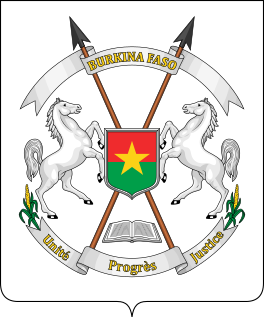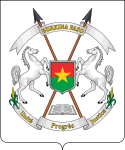
The Politics of Burkina Faso takes place in a framework of a semi-presidential republic, whereby the Prime Minister of Burkina Faso is the head of government, and of a multi-party system. The President of Burkina Faso is the head of state. Executive power is exercised by both the President and the Government. Legislative power is vested in both the government and parliament. The party system was dominated by the Congress for Democracy and Progress (CDP) until the 2014 Burkinabé uprising. Since then, the CDP has lost influence. The Judiciary is independent of the executive and the legislature. The Economist Intelligence Unit rated Burkina Faso as a "hybrid regime" in 2016.

The history of Burkina Faso includes the history of various kingdoms within the country, such as the Mossi kingdoms, as well as the later French colonisation of the territory and its independence as the Republic of Upper Volta in 1960.

The Congress for Democracy and Progress was the ruling political party in Burkina Faso until the overthrow of Blaise Compaoré in the year 2014.

Presidential elections were held in Burkina Faso on 13 November 2005. Incumbent president Blaise Compaoré was re-elected with around 80% of the vote.

The Popular Front was a political alliance in Burkina Faso. The FP was founded in October 1987 by that country's current President, Blaise Compaoré, immediately after he came to power in a military coup d'état. The first member parties of the FP were the

The Party of Labour of Burkina was a political party in Burkina Faso.
Articles related to Burkina Faso include:
Bognessan Arsène Yé is a Burkinabé politician who was President of the Assembly of People's Deputies of Burkina Faso from 1992 to 1997, President of the Congress for Democracy and Progress (CDP) from 1996 to 1999, and a Minister of State from 1997 to 2000. He was appointed as Minister of State for Relations with Parliament and Political Reform in April 2011.

Presidential elections were held in Burkina Faso on 21 November 2010. Incumbent president Blaise Compaoré was re-elected with 80% of the vote. The elections were marred by claims of widespread fraud.

Parliamentary elections were held in Burkina Faso on 2 December 2012. They were the first elections held since the National Assembly dissolved the National Electoral Commission in 2011, following fraud allegations concerning the 2010 presidential elections. Municipal elections for over 18,000 councillors were held simultaneously. The elections were held amidst a period of political uncertainty, following protests against President Blaise Compaore's regime.

General elections were held in Burkina Faso on 29 November 2015. The elections were the first national elections in the country since the 2014 Burkinabé uprising and the departure of President Blaise Compaoré, who had ruled Burkina Faso for 27 years. The party of former President Compaoré, the Congress for Democracy and Progress, was banned from running a presidential candidate but was still able to participate in the parliamentary election.

The Burkinabé uprising was a series of demonstrations and riots in Burkina Faso in October 2014 that quickly spread to multiple cities. They began in response to attempts at changing the constitution to allow President Blaise Compaoré to run again and extend his 27 years in office. Pressure for political change came from civil society and in particular from the country’s youth. Following a tumultuous day on 30 October, which included the involvement of former Defence Minister Kouamé Lougué and the burning of the National Assembly and other government buildings as well as the ruling Congress for Democracy and Progress party's headquarters, Compaoré dissolved the government and declared a state of emergency before eventually fleeing to Côte d'Ivoire with the support of President Alassane Ouattara.

The National Convention of Progressive Patriots–Social Democratic Party was a political party in Burkina Faso led by Pierre Tapsoba.

The Greens of Burkina is a political party in Burkina Faso.
Zéphirin Diabré is a Burkinabé politician. He served in the Government of Burkina Faso as Minister of Finance during the 1990s. He stood as a candidate in the November 2015 presidential election, placing second behind Roch Marc Christian Kaboré. Zéphirin Diabré is an economist by training and holds a doctorate in management sciences from the Faculty of Economics and Management of Bordeaux, France. He joined the University of Ouagadougou in 1987 as assistant professor of management before joining the private sector between 1989 and 1992 as deputy director of Brakina. He was elected MP in 1992 under the banner of the Organization for Popular Democracy-Labour Movement, but gave up his seat to his deputy to occupy respectively the positions of Minister of Trade, Industry and Mines (1992-1994), ministers of the Economics and Finance (1994-1996), President of the Economic and Social Council (1996-1997). He leaves the Congress for Democracy and Progress for reasons of differences and opts for an international career. Initially a researcher at the American Harvard University, then deputy general manager of United Nations Development Programme (UNDP) of the United Nations and then Africa and Middle East director of the AREVA group, Zéphirin Diabré chose to return to the fold. In May 2009, Zéphirin Diabré already announces the colors of alternation by organizing a forum on the subject in Ouagadougou. On March 1, 2010, he and other comrades created the UPC, an opposition political party that advocates democratic change and "real change" in Burkina Faso.

A constitutional referendum will be held in Burkina Faso on 24 March 2019. If approved, the new constitution will end the Fourth Republic created in 1991.







